The sun was slowly setting over the vast Karoo horizon, turning the sky from apricot-orange to fuschia-purple as I danced with thousands of costumed people to music streaming from a purple bus and a mobile pirate ship. A massive gyrating skeleton towered over us while our feet kicked up clouds of dust from the cracked desert floor. Day turned into night and all around us Tankwa Town lit up in pulsating rainbow-coloured LED lights underneath a blanket of stars in a sky so big you can see the curvature of the Earth.
This was Saturday at AfrikaBurn, the biggest night of the annual festival in the Karoo desert near Cape Town. A few hours later we gathered together again to watch artworks built just for the festival go up in flames in beautifully primal ceremonies.
As the organisers say, ‘For those that have been no explanation is necessary, for those that haven’t none is possible.’ It’s hard to put AfrikaBurn into words. It defies a simple definition. It’s not a trance party or music festival or a gathering of hippies. It’s a temporary surreal world built by everyone who makes the long trek into the middle of nowhere. Each year, for six days, a town is constructed in the Tankwa Karoo where money means nothing and 6500 festival-goers create their own magic: there are amazing artworks, performances, bands, DJs, dance floors, yoga classes, swimming pools, pop-up cocktail bars, pancake stands, a post office and many more interactive experiences, all for free. Once the festival is over, everything is packed up and there’s no trace left to indicate that anything happened.
I’d been to AfrikaBurn last year for the first time, not knowing what to expect, and was completely overwhelmed by it. This year was no different. Even though I had an idea of what was in store, it still blew my mind. I watched an incredibly beautiful burning performance set to ethereal music, where animal structures were set on fire and manipulated like puppets, got absorbed by 3D glasses in a holographic tunnel of lights, drank chilli vodka out of a pink plastic penis attached to a motorbike, learnt to shower with a 500ml water bottle, ran screaming into the night with my cape flowing behind me, hugged strangers, made new friends, bonded with old friends, got lost in the dark of the Binnekring and stumbled upon artworks I could never find again and danced for five days straight (next to a mobile cocktail bar pumping out music at sunset, inside a string of LED lights in the middle of nowhere, on top of the purple bus, underneath a wooden man with glowing red eyes, inside the Miniscule of Sound – a tiny dance floor inside a shiny cardboard box with a mirror ball warmed by a flamethrower, under lasers that looked like the Northern Lights, next to a cheese grater and on top of a moving purple snail. I got a message from the universe inside a crunchie, a grape ice lolly on a hot afternoon from a small boy, a handmade pouch filled with seeds to plant bonsai, an ice cold beer from a medieval soldier out in the desert and red wine from a cart playing electro music at sunset.
We survived dust storms, extreme heat and dryness, chillingly cold nights and no running water and created a town with no hierarchy and no point other than the temporary experience. AfrikaBurn allows you to completely let go – whether that means getting naked or wearing a bizarre costume or dancing the funky chicken. That everyone subscribes to the ethos of the festival and in their own way participates makes me feel optimistic about the potential for society to improve. It’s uplifting, inspiring and changes your perspective more than anything else can. I returned home with dust-encrusted dreadlocked hair, an incredibly sore body and a bag full of gifts I will treasure, already planning my costumes and contributions for next year, thinking about how I can incorporate a bit of the magic, generosity and community spirit of AfrikaBurn into the ‘real’ world.
The lowdown on AfrikaBurn
‘AfrikaBurn is the spectacular result of the creative expression of a community of volunteers who, once a year, gather in the Tankwa Karoo to create a temporary city of art, theme camps, costume, music and performance.’
AfrikaBurn started in 2007, when it had less than 1000 people. It’s grown radically – last year it had 5300 and in 2013 6500 tickets were sold. It takes place on Stonehenge farm in the middle of nowhere (on the longest stretch of road in South Africa without petrol stations or nearby assistance), 300 kilometres north of Cape Town near Ceres in the Northern Cape’s semi-desert Tankwa Karoo. It’s South Africa’s version of the Burning Man festival in Nevada, USA.
Tankwa Town, the name of the AfrikaBurn space, is structured in a giant circle, with art works in the middle (the Binnekring) and the theme camps on its circumference, with the camping area behind them (the Buitekring). There are road names on a map and street signs to help you find your way home (and set up a camping spot in advance if you’re staying with a big group). There are toilets (the good ol’ portapotties, and long drops), roads, medics and not much else in terms of facilities. There’s nothing for sale so you need to bring your own water, food and any other provisions.
Tickets this year were on a tiered system, starting from R400 and going up to R800. The idea is that you pay for the ticket you can afford. If you can’t pay R400 then you can apply for a low-income ticket (the aim is to make the event inclusive and accessible to everyone). The money from ticket sales goes towards running the festival and funding artworks (AfrikaBurn is a not-for-profit company). In 2013 tickets sold out fast. If you’re planning to go to the festival in 2014, buy your tickets as they go on sale (this year the most expensive tickets went on sale first, in November). A lot of people think that AfrikaBurn is some kind of giant bartering market, where you swap a beer for a back massage. It’s not like this at all. It’s a decommodified space, where nothing commercial (except the sale of ice) takes place (you even need to cover up obvious logos or branding on your vehicles).
There’s a gift economy, where gifts are given unconditionally, without an expectation of a similar gift in return. This is probably my favourite thing about AfrikaBurn – the selfless and magical gifting that happens all the time, whether it’s egg rolls being given out to hungover burners Saturday morning, hearty soup shared out for dinner, or mojitos and shots of Jagermeister from a mobile bar. AfrikaBurn’s central tenet is participation. There are no organised bands or DJs or entertainment and the festival doesn’t happen without involvement from festival goers.
You can participate by organising a theme camp (this can be anything from a dance floor or a massage centre to the ‘Land of Soft Things’ – an area filled with giant couches and cushions), or a mutant vehicle (creatively converted and decorated cars, buses and trucks which drive people around the Binnekring), making an art installation or just by dressing up in a crazy costume. The amazing thing is that it seems like almost everyone does participate and puts on some incredible music, art and interactive experiences.
This post was originally published on www.sarahduff.com. Click here to see more of my photos from AfrikaBurn 2013.
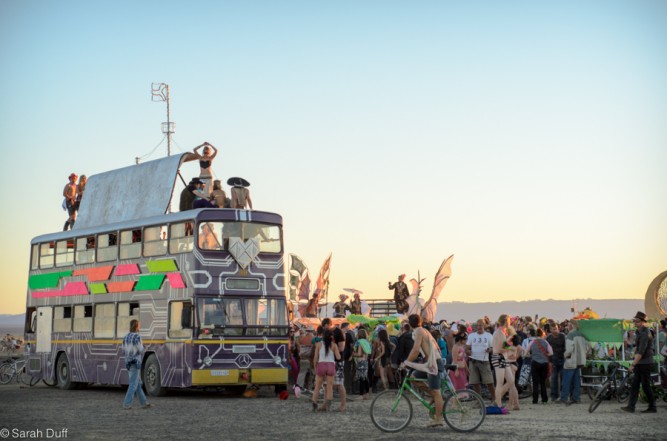
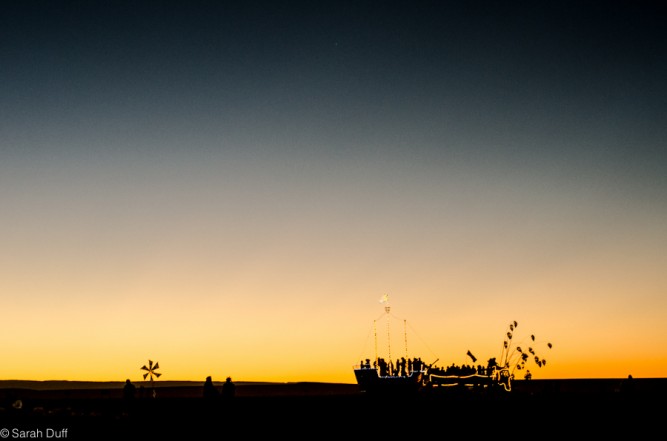
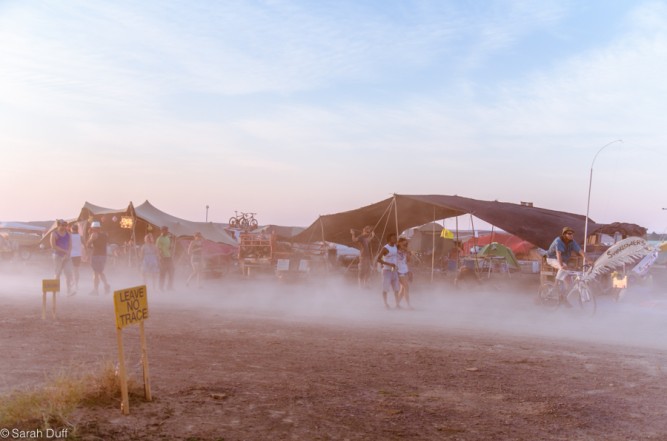
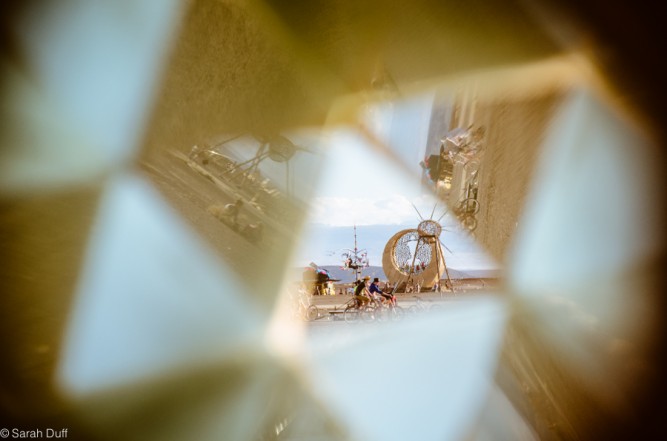
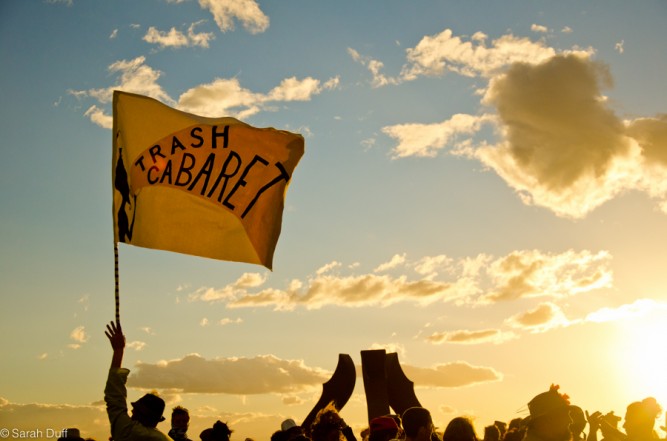
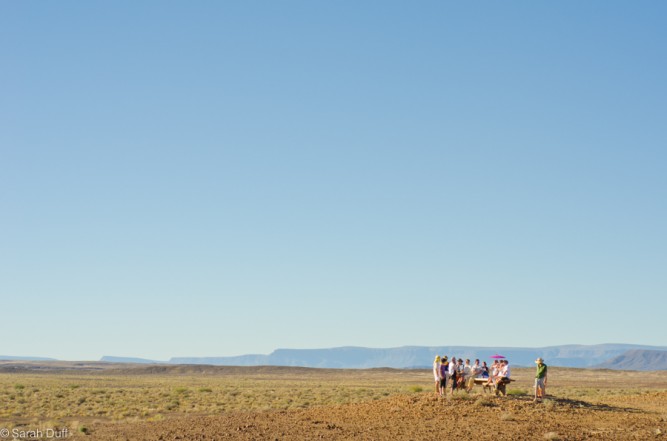
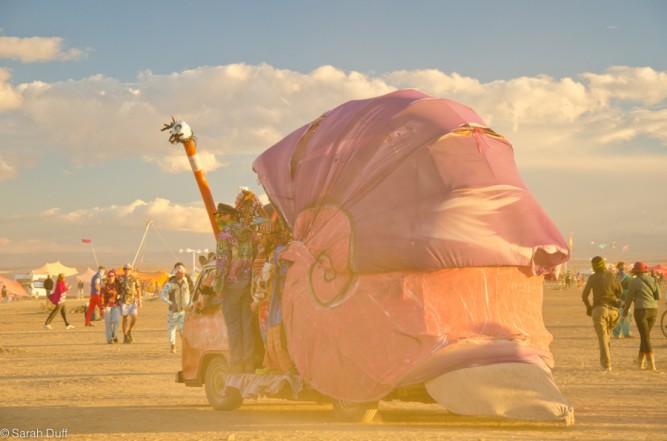
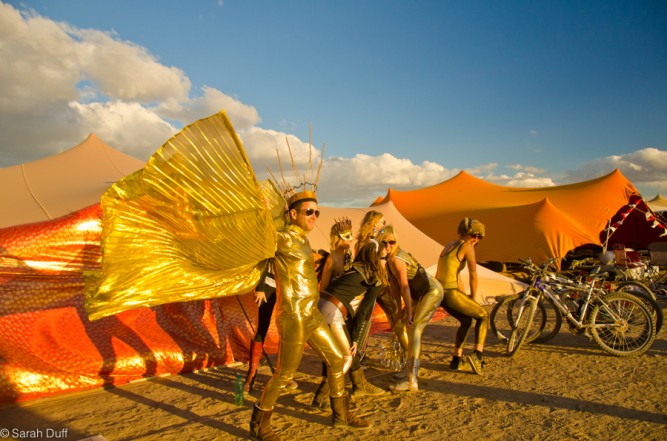
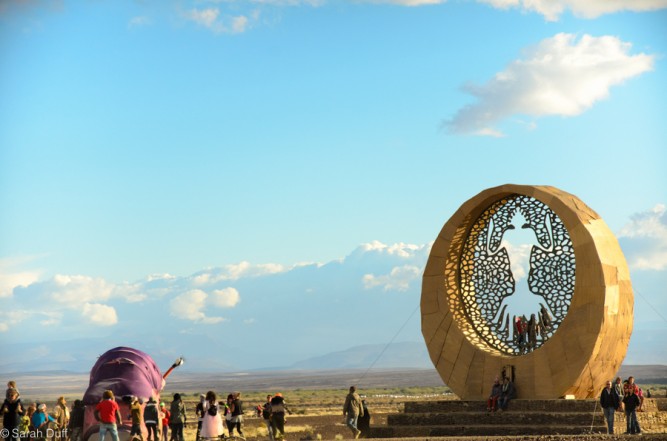
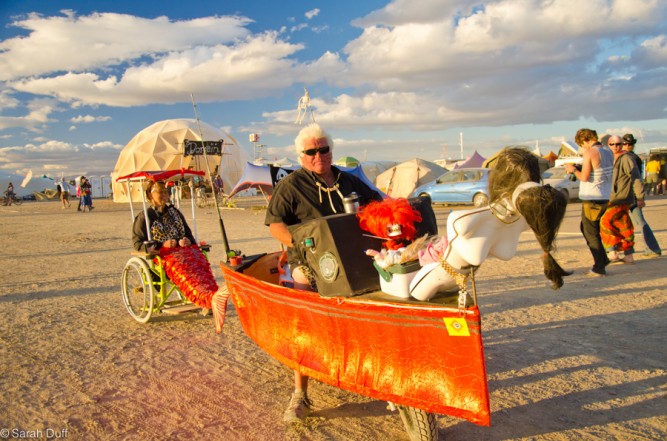
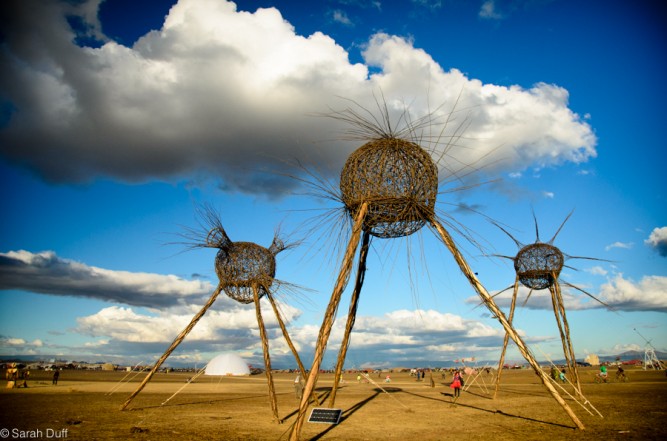
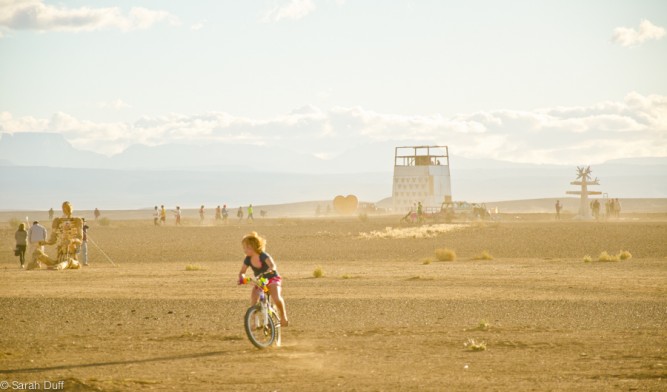
You may also like
Related Posts
If you planned on attending any of the following festivals or visiting these attractions, you're...
read more
The music, beautiful setting and mass of floats create a laid-back party vibe at Up...
read more
The Stanford Street Festival is an outdoor street festival that captures the thrill of summertime...
read more